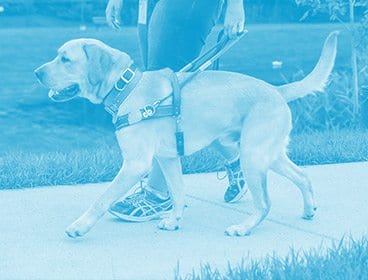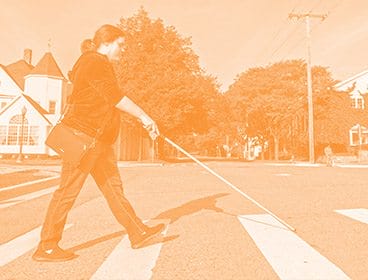
Adopt a Dog
Our dogs are bred, raised and trained to be Leader Dogs, guiding those who need them to a life of confidence and independence. Our staff and volunteers work year-round to prepare these dogs to be the eyes of someone who is blind, and our supporters give generously to make that work possible. However, since Leader Dogs must meet a very high standard to be matched with our clients, some of our dogs eventually go on to other “careers.”
We work hard to make sure every one of our dogs that goes through a “career change” ends up in the best possible place. As our dogs were raised to become guide dogs, we prioritize placement of our career change dogs into alternative careers with organizations that will continue their training in service, detection, veteran and court advocacy dog organizations. Dogs that are not placed in an alternate career are then first offered to the person who raised it, followed by others who have played an important role in the dog’s life.
The dogs that are not placed will be available for adoption to loving homes. While we appreciate the substantial interest in our adoptable career change dogs, keep in mind that only about 100 dogs become available for public adopters per year. Typically, a career change dog will be available for public adopters to meet and potentially adopt within 3-12 months from the time a career change dog adoption application is submitted.
How to Adopt
Leader Dogs for the Blind requires that all prospective applicants attend an orientation about our career change program. Orientations are offered free of charge. If you are interested in adopting a dog after you complete an orientation, applications will be available and may be submitted with a $25 fee. A $2,000 tax-deductible donation is expected at the time of adoption.
Please note that we are not accepting applications for golden retrievers at this time.
- After you attend an orientation and complete your application, we will keep it on file until we find a dog to match with you or you notify us that you no longer wish to be on the list.
- We will notify you once a match has been made. Due to the amount of interest in our career change dogs, our team cannot respond to every inquiry about status updates regarding adoption.
- Adopters must be willing to travel to campus at their own expense. We do not ship dogs.
Dogs that are career changed for medical reasons may have allergies, hip or elbow dysplasia, etc. Though the medical issue may be minor, it’s important to keep in mind that adopting a dog with a health issue may mean more veterinary and health-related costs throughout the dog’s lifetime. Being career changed for behavioral reasons may mean that the dog had a high level of distraction or excitability, anxiety, lack of initiative, etc. Retired Leader Dogs that have been returned to Leader Dogs for the Blind by their handlers are also occasionally available for adoption.
On average, we have 100 dogs become available for public adopters per year. Once a career change dog adoption application is submitted, public adopters can typically expect a 3-12 months wait time before being able to meet and potentially adopt a career change dog.
Applicants open to any breed (lab, golden, shepherd or a cross), gender and activity level (calm, fairly active or very active) will typically have the opportunity to meet/adopt a dog within a year of when they submitted their application. Applicants with more specific and/or less common requirements in mind (e.g. a calm, female golden retriever) are likely to wait for four years at a minimum.
Keep in mind:
- The wait time for a female is significantly longer than the wait for a male.
- Labradors are the most common breed available. The wait for a golden retriever, German shepherd or cross is much longer. Please note that we are not taking applications for golden retrievers at this time.
- Applicants with children under the age of 6 will have a longer wait time than those without.
- Applicants with no breed or gender preference will be matched with a dog quicker than those with strong preferences.
- Applicants willing to adopt dogs with medical conditions will be matched with a dog quicker than those who are not.
In addition to the $25 application fee, there is a $2,000 donation expected at the time of adoption. This donation helps offset the cost of breeding, health maintenance, care and training that the dog received while on campus. Leader Dogs for the Blind is recognized by the IRS as a tax-exempt organization under section 501(c)(3).
- Labrador retrievers – 80%
- Labrador/golden crosses – 10%
- Golden retrievers – 5%
- German shepherds – less than 5%
Labrador retrievers are our most commonly available breed, so wait times for them will be lower. Wait times for golden retrievers and German shepherds range from 1‒4 years.
The dogs available for adoption have varying levels of training depending on what point in the training process the dog was career changed. Some dogs do not undergo any formal training if they have a medical condition preventing them from being a working Leader Dog. Other dogs are career changed much later in the training process. Most of the dogs available for adoption are career changed for medical or behavioral reasons. We occasionally have retired Leader Dogs available for adoption. Please note that having received guide dog training does not mean the dog will have better house manners.
The puppies from our breeding colony are raised by volunteer puppy raisers until they are 12–15 months of age. We have puppy raisers around the nation who have welcomed Future Leader Dogs into their homes. There are also several prisons throughout the country that have inmates raising puppies as well. When a dog is returned to Leader Dogs for the Blind from the puppy raiser, it receives a thorough medical evaluation including vaccine updates, neutering and x-rays to check for early signs of hip and elbow dysplasia.
The majority of the dogs available for adoption are 1–2 years old. Some dogs are younger and some are older.
Career change dogs are pets and have no access rights under the ADA. Leader Dogs for the Blind partners with several organizations that adopt career change dogs with the potential to succeed in their respective programs. Every career change dog is evaluated for its potential to work in an alternative career prior to being available for adoption. Dogs we feel are suitable for alternative careers are adopted by organizations that train working, therapy or service dogs. If you are interested in a therapy or service dog, we encourage you to visit Assistance Dogs International.
While you’re considering bringing a new furry friend into your life, take a minute to explore our volunteer puppy raising program. Not only will you be able to bring home a puppy much sooner than you are likely to adopt a career change dog, raising a Future Leader Dog is a life-changing adventure for you and the gift of a lifetime for someone in need.



